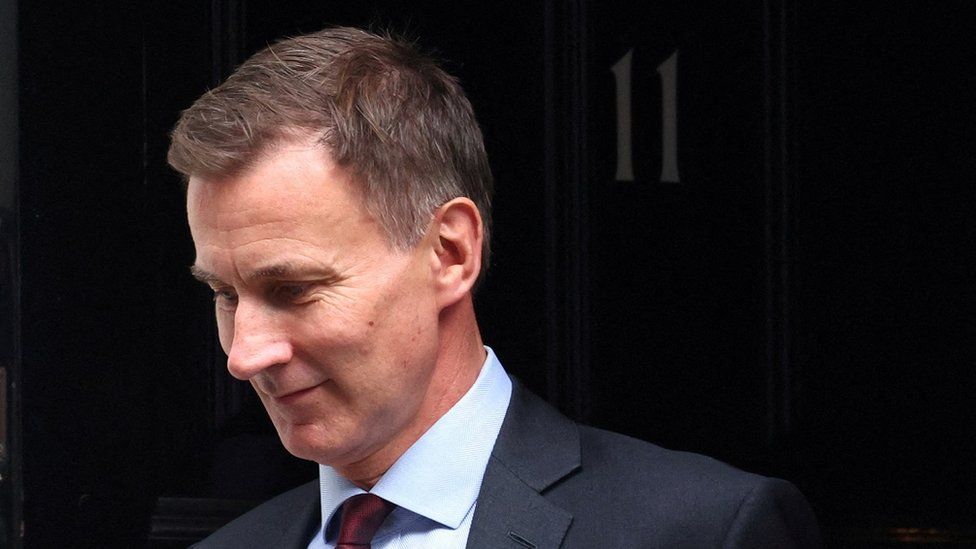
The chancellor is considering cutting inheritance and business taxes in next week’s Autumn Statement, the BBC has been told.
It is thought Jeremy Hunt’s decision will depend on the latest predictions from the UK’s main economic forecaster.
A Treasury source said no final decisions had been made, but Mr Hunt refused to rule it out in a BBC interview.
It comes as he announced a £4.5bn pot to boost British manufacturing.
Businesses in the automotive, aerospace, life sciences and clean energy sectors will be among firms in line to receive government funds where the “the UK is or could be world-leading”, Mr Hunt said.
The chancellor is expected to receive the latest economic forecast from the Office of Budget Responsibility (OBR) – a body which assesses the health of the UK’s finances and is independent of the government – on Friday.
While it is understood Mr Hunt will consider tax cuts over the weekend, as first reported by the Financial Times, a Treasury source told the BBC it is possible such policy decisions are delayed until the spring.
Mr Hunt has previously said tax cuts are “virtually impossible” and instead warned of “frankly very difficult decisions” in the Autumn Statement, which is when he will outline the government’s latest tax and spending decisions.
Despite playing down expectations of tax cuts, economists have estimated the chancellor could have more than £10bn to spend on such measures.
In an interview with the BBC, Mr Hunt refused to rule out a cut to inheritance tax, saying: “The best way that we can reduce the tax burden for everyone is to grow the economy.”
- What is inheritance tax and will it be cut?
- Are autumn tax cuts really ‘impossible’?
- What is the OBR and why does it matter?
Tax levels in the UK are currently at their highest since records began 70 years ago, according to the Institute for Fiscal Studies think tank. The government’s single biggest source of revenue is through taxes on people’s earnings, known as income tax, but there has been no speculation of cuts to that.
However, the BBC has been told Mr Hunt is considering cutting inheritance tax, which is a 40% tax on the value of the estate – the property, money and possessions – of someone who has died.
The tax is charged on the part of an estate that’s above the threshold, but only applies to about 4% of estates and no tax is paid if the estate is valued at less than £325,000, or if anything above this threshold is left to a husband or wife, civil partner, charity, or a community amateur sports club.
If a home is part of the estate and a person’s children and grandchildren stand to inherit it, then the threshold can go up to £500,000.
The tax sparks considerable debate, partly owing to the fact many people are concerned about it and find it difficult to understand.
Benefit cuts?
There have also been reports that the government is considering using October’s inflation figure of 4.6%, rather than September’s inflation figure which is 6.7%, to uprate benefits, which would cut working-age benefits spending by about £3bn. The government usually uses September’s inflation date to set the increase.
The chancellor did not deny such a move, but said the government would be “compassionate” and the the welfare system needed to be reformed “because we believe that making work pay is a vital part of our economic success”.
It is not clear what business taxes the chancellor might cut, but there are expectations that a tax break which allows firms to offset 100% of the money they spend on new machinery and equipment against their profits, will be extended or possibly be made permanent.
This policy – known as “full expensing” – is due to expire at the end of the 2025 tax year.
The amount of cash the government deems it has available to spend – and introduce tax cuts – is subject to its own, self-imposed spending and taxation – or fiscal – rules. Whether and how the government meets its rules, depends on its policy choices.
Most governments of wealthy countries follow fiscal rules in an attempt to maintain credibility with financial markets, which help to fund their plans.
Labour leader Sir Keir Starmer said he would wait to see what was in the Autumn Statement before commenting.
The chancellor’s boost for manufacturers comes amid sluggish economic growth in recent times and fears the UK could lose out on investment opportunities to other countries in industries creating future jobs.
Mr Hunt told the BBC he had spoken to Elon Musk, the owner of the electric car firm Tesla, about investing in the UK.
“I would love to have a Tesla factory in the UK anytime. Let’s be clear, that is a fantastic company,” he said, adding that £2bn of the pot was earmarked for the automotive industry to develop zero-emission vehicles.
“I spoke to Elon Musk about this and he said it’s not about the support. It’s about the environment. And he loves London because there’s so much tech going on and Tesla is essentially a tech company, so let’s see what happens,” he added.
Related Topics
- Autumn Statement
- Tax
- UK taxes
- UK economy
- Jeremy Hunt
- Office for Budget Responsibility
-
What is inheritance tax and will it be cut?
-
10 hours ago

-
-
Are autumn tax cuts really ‘impossible’?
-
1 day ago

-
-
What is the OBR and why does it matter?
-
7 November

-





